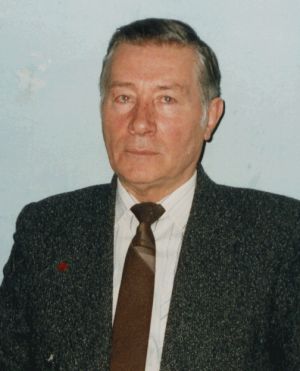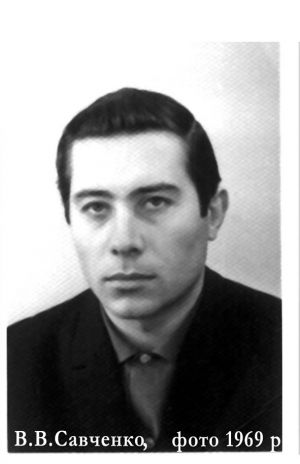SAVCHENKO, VIKTOR VASYLOVYCH (b. March 22, 1938, in Voznesensk, Mykolaiv Oblast - d. August 31, 2016, in Dnipro).
Scientist (chemist), writer. Distributed *samvydav* and O. Honchar’s novel *The Cathedral*.
From a working-class family. From the age of 16, Viktor worked in production and studied at an evening school, which he graduated from in Voznesensk in 1958. From 1958 to 1963, he studied at the Faculty of Chemical Technology of the Dnipropetrovsk Metallurgical Institute. He worked at the Makiivka Research (1963–1965) and Dnipropetrovsk Metallurgical Institutes (1968–1970).
During his postgraduate studies (1965–1968), he met Mykhailo Chkhan, an engineer and poet, whom Savchenko credits with instilling in him a sense of patriotism and a passion for his native history. Until then, he had written about scientists, but he began a novella about the Zaporozhian Cossacks and about Dmytro Yavornytsky. He attended the Pavlo Kononenko literary association at the regional branch of the Writers’ Union and met aspiring writers. He was elected deputy head of the literary association.
When Oles Honchar’s novel *The Cathedral* was published in the first issue of the journal *Vitchyzna* in 1968, and later as a separate book in the “Novels and Novellas” series, Savchenko bought 40 copies and gave them to students. “*The Cathedral*,” Savchenko believes, “was, one could say, a ‘provocation’ against the consciousness of our citizens. *The Cathedral* became a barricade that arose between the creative intelligentsia and the authorities. Not all people in power condemned *The Cathedral*—there were some who supported it. But the official propaganda, especially the KGB, which was effectively the executor of the authorities' power against Honchar, began to track those who stood up for *The Cathedral*. I also fell into that category… Honchar became a star of the first magnitude; he was one of that system—and he said what no one else dared to say. This was of extraordinary importance, because in our society, people like Honchar were trusted more than dissidents or human rights activists.”
A smear campaign against O. Honchar and those who defended him began in the press. As deputy head of the literary association, Savchenko pursued a line of not allowing Honchar to be bullied. A member of the literary association, student Ivan SOKULSKY, began to collect facts about the persecution of O. Honchar and his supporters, which resulted in the “Letter from the Creative Youth of Dnipropetrovsk.” Savchenko edited the “Letter...” and was also one of its many respondents: he reported on the speeches at the Writers’ Union by Mykhailo Chkhan and Valentyn Chemerys and their subsequent “dissection” at party meetings.
I. SOKULSKY gave Savchenko the “Letter...” to read but asked him not to make corrections, except perhaps neatly in pencil so they could be erased. He also received and read other *samvydav* literature, including V. MOROZ’s *Report from the Beria Reserve*, academician A.G. Aganbegyan’s *The Current State of the Soviet Economy*, General Petro Hryhorenko’s speech in defense of the deported Crimean Tatars, M. Braichevsky’s *Reunification or Annexation?*, and I. DZYUBA’s *Internationalism or Russification?*, among others.
In the spring of 1969, Mykola KULCHYNSKY typed up a large number of copies of the “Letter...”, which were sent to many official addresses, circulated by hand, and broadcast on Radio “Svoboda”. On June 14, 1969, I. SOKULSKY and M. KULCHYNSKY were arrested. A week later, a KGB agent brought Savchenko in for questioning. Investigator Anatoliy Tutyk, an old-school NKVDist, suggested he confess. Savchenko's situation was eased by the fact that he actually knew nothing about the production of the “Letter...”. He also remembered his teacher’s and grandmother’s admonition not to inform on others. Therefore, he did not name a single person during the interrogations. However, a witness named Pyrlyk testified that he had received from Savchenko General HRYHORENKO's speech at the anniversary evening of writer V. Kosterin in defense of the Crimean Tatars, and a speech by academician A.G. Aganbegyan at the “Mysl” publishing house titled *The Contemporary State of the Soviet Economy*. Savchenko was also accused of giving Pyrlyk a book by Mykhailo Molnar, *Slovaks–Ukrainians*, published in Czechoslovakia, which he had received from Svyatoslav Mandebura of Kharkiv. Three documents already constituted “systematic distribution of anti-Soviet literature,” Article 187-1 of the Criminal Code of the Ukrainian SSR. The interrogations lasted until November. He was under a written pledge not to leave the city. His apartment was searched, but nothing incriminating was found. When investigator Fedir Pokhyl presented Savchenko with I. SOKULSKY's confession that he had indeed given Savchenko the speeches by HRYHORENKO and Aganbegyan, Savchenko demanded a face-to-face confrontation. Cornered by the testimonies of I. SOKULSKY and the provocateur Pyrlyk, Savchenko continued to insist that he did not remember such a thing, but had to say: “Well, I suppose so, if Ivan says so.”
The Dnipropetrovsk Regional Court, presided over by a judge named Tubilets, heard the case from January 19 to 27, 1970. Savchenko sat on the defendants’ bench, but not under guard. He had seriously prepared for his defense, in particular, by collecting similar publications by M. Molnar in the Soviet press. Since his lawyer, P.P. Yezholy, effectively acted as a prosecutor, Savchenko dismissed him and defended himself. He was supported by SOKULSKY's lawyer, V.B. Romm from Moscow, who asked the court whether this book was on the list of literature banned from being brought into the Soviet Union. The court could not answer. On the last day of the trial, the witness Mandebura brought Savchenko the newspaper *Literaturna Ukrayina* with a notice that the incriminating work by Molnar was being published in Ukraine by the “Dnipro” publishing house. In one of the court sessions, lawyer V.B. Romm stated that no cases had been initiated against HRYHORENKO or Aganbegyan and that it was shameful to issue even a separate ruling for an offense like Savchenko’s.
According to the verdict in this case, I. SOKULSKY was imprisoned for 4.5 years in strict-regime camps under Article 62, Part 1 of the Criminal Code of the Ukrainian SSR; M. KULCHYNSKY received 2.5 years in general-regime camps under Article 187-1; and Savchenko received a 2-year suspended sentence with a three-year probationary period under Article 187-1.
When Savchenko went to collect his documents from the court a few days later, the judge told him: “You're lucky to be tried now and not ten years ago—back then, they would have just shot you.” “Stalinism,” Savchenko believes, “was the peak of brutality. We found ourselves on the slope of that peak of brutality.”
Savchenko was fired from his job 5 times. Eventually, his wife Halyna went to talk to the secretary of the regional committee of the CPU, Pashchenko, after which Savchenko was allowed to keep a job as a rank-and-file engineer at the Dnipropetrovsk branch of the Institute of Mineral Resources of the Ministry of Geology of Ukraine (1970–1988). He did not defend his candidate’s dissertation on the topic “Interaction of Germanium with Aluminum, Iron, and Magnesium Hydroxides in Connection with Its Accumulation in Bauxites” until 1980.
On the last evening of his probationary period, January 27, 1973, he was summoned by KGB agents Mazhara and Kapustnikov, who for several hours tried to persuade him to become their informant. Savchenko eventually joked and offered to take a job with the KGB. They laughed, and General Mazhara said: “Alright, you can go. But remember—don’t get in our way of building communism.”
In 1972, the editors of the Donetsk journal *Donbas*, Kost Teslenko and Hryhoriy Kryvda, published Savchenko's novella *I Will Return Yet*, along with selections of poems by V. SIRENKO and M. Chkhan, who were being persecuted by the KGB. For this, Teslenko and Kryvda were fired. The novella was published as a separate book only in 1982 by the “Molod” publishing house in Kyiv, under the title *The Parrot’s Alarming Cry*.
In 1984, books of his fantastic stories and novellas written “for the drawer” during the years of persecution were published: *The Consular Tower* and *A Night in the Carboniferous*. That same year, Savchenko was admitted to the Writers’ Union. New books followed: *Only a Moment* (1988, novel), *Adventure on the Fifth Horizon* (1990, stories and novellas). For the 140th anniversary of D. Yavornytsky in 1995, Savchenko’s play *Born Under the Sign of Scorpio* was published in the journal *Kuryer Kryvbasu*; it was staged for two years at the T. Shevchenko Dnipropetrovsk Academic Theater.
Savchenko is the author of a number of science fiction novels, novellas, and stories, which were published as separate books and in collections, as well as books of esoteric research. Some works were translated into Russian, Hungarian, Czech, and Slovak. He compiled and published the *Anthology of Poetry of the Dnipro Region* and the *Anthology of Prose of the Dnipro Region*, as well as two books of essays on poets and prose writers of the Dnipro region: *God Does Not Give a Cross Beyond One’s Strength* (1999) and *A Path of Three Generations* (2003).
In the All-Ukrainian “Readers' Choice” competition for the best science fiction book, which ran throughout 1989, he took third place (the “Chumatsky Shlyakh” diploma). He was awarded the D. Yavornytsky Literary Prize (1995), the “Blahovist” Prize (1998), the I. Mazepa Prize (2008); the medal “For a Significant Contribution to the Revival of Spirituality and Personal Achievements in Literary Work” (2008), and the Order of the Holy Equal-to-the-Apostles Prince Volodymyr the Great, III degree, of the UOC (2008) for his services in the revival of spirituality in Ukraine.
From 1994 to 2002, he headed the Dnipropetrovsk organization of the National Writers’ Union of Ukraine. He was twice elected by writers’ congresses as a member of the Council and Presidium of the NWUU. He holds a Candidate of Chemical Sciences (1980) and a Doctor of Philosophical Sciences (2011).
He lives in Dnipropetrovsk. His wife (until their divorce) was Halyna Savchenko (née Stilchuk), and his son Ihor was born in 1965.
Bibliography:
1.
“Chronicle of a Criminal Trial.” // *Suchasnist*, No. 9, 1993, pp. 153–163. https://museum.khpg.org/1209675708
Interview with V. Savchenko by KHPG, April 4, 2001. https://museum.khpg.org/1209675256
2.
“The Trial in Dnipropetrovsk.” // Chornovil, V. *Works: In 10 volumes*. – Vol. 3. (*Ukrainian Herald*, 1970-72) / Compiled by Valentyna Chornovil. Foreword by M. Kosiv. – Kyiv: Smoloskyp, 2006. – pp. 169–174; In the same volume: M. Plakhotniuk. “The Truth Is on Their Side (A Response to Slanderers).” – pp. 173-187.
“Viktor Savchenko.” // *Writers of Ukraine: A Reference Book* / Compiled by Vira Pavlovska, Lyubov Bubnova, Lyudmyla Sirenko. — Kyiv: Ukrainskyi pysmennyk, 2006. — p. 359.
*Journeys of a Lifetime*. Interview with P.P. Rozumny. // *Kuryer Kryvbasu*, No. 198, 2006, p. 132. https://museum.khpg.org/1135976930
Iryna Holub. “Biographical Sketch of Viktor Savchenko, a Contemporary Dnipropetrovsk Writer and Playwright.” // *Dnipropetrovshchyna*. Regional information portal http://www.irp.dp.ua.
*International Biographical Dictionary of Dissidents in Central and Eastern Europe and the Former Soviet Union*. Vol. 1. Ukraine. Part 3. – Kharkiv: Kharkiv Human Rights Protection Group; “Prava Lyudyny,” 2011. – pp. 1301–1305. https://museum.khpg.org/1209674692
*Resistance Movement in Ukraine: 1960–1990. An Encyclopedic Guide* / Foreword by Osyp Zinkevych, Oles Obertas. – Kyiv: Smoloskyp, 2010. – p. 551; 2nd ed.: 2012. – p. 628.
Vasyl Ovsiyenko

Viktor SAVCHENKO. Photo by V. Ovsiyenko, April 4, 2001.
